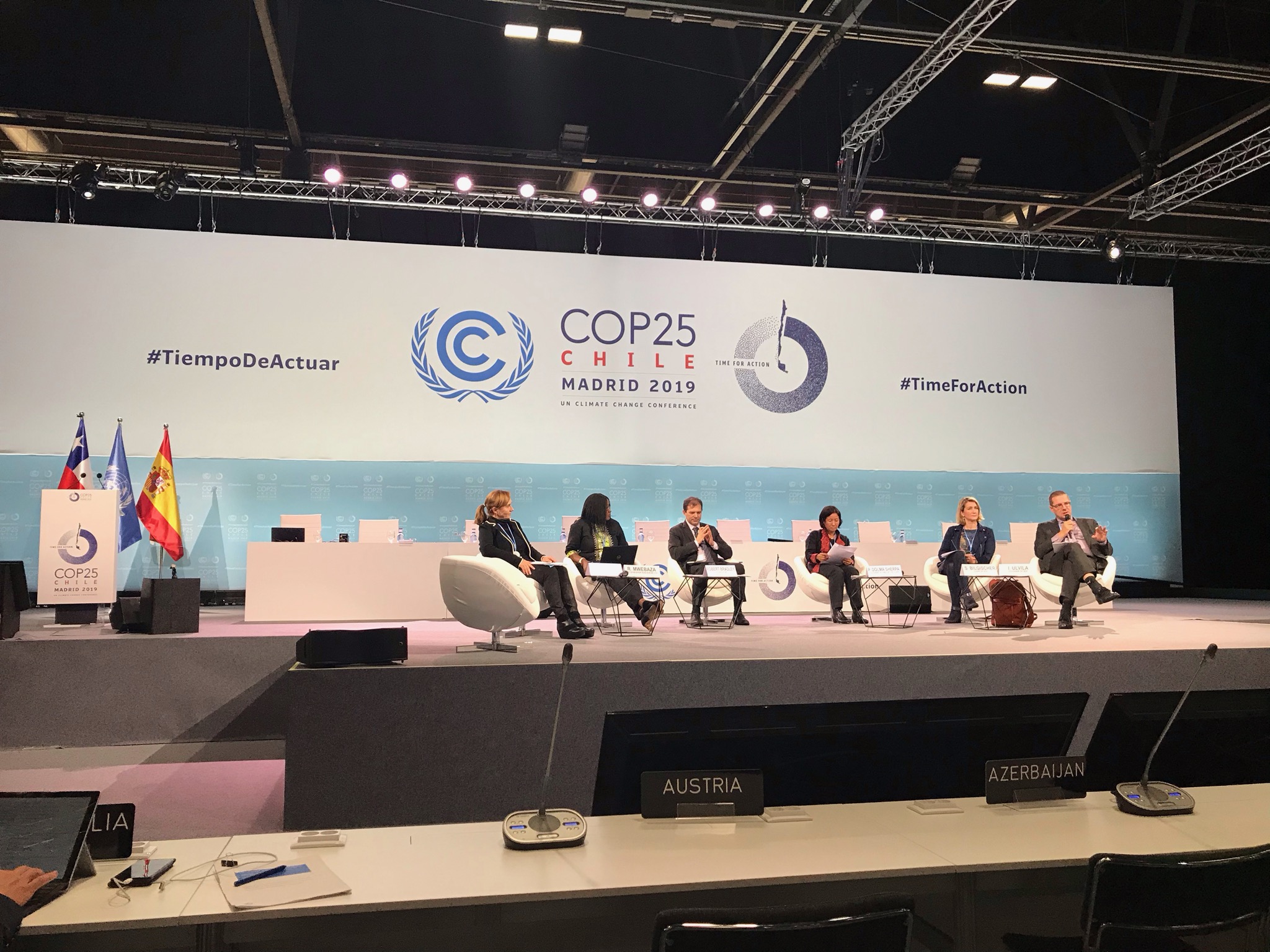Pair of Decisions Made at COP 25 Help Solidify Institutional Arrangements of Adaptation Fund
Washington, D.C. (December 19, 2019) – Despite some of the larger challenges at the UN COP 25 climate conference in Madrid, Spain that concluded last weekend, the Adaptation Fund was included in a couple of key decisions that helped strengthen its institutional arrangements.
The decisions were made by the 15th session of the Conference of the Parties serving as the meeting of the Parties to the Kyoto Protocol (CMP 15) as part of its decision on the Report of the Adaptation Fund Board, and included extending the Fund’s institutional arrangements with the World Bank and Global Environment Facility (GEF).
The decisions came near the end of COP 25, following most of the Fund’s activities at the conference and after it mobilized close to USD 90 million in new pledges in 2019 from a record 11 contributors.
Within the decisions, Parties to the CMP adopted amendments to the Fund’s arrangements with the World Bank to provide services as its interim trustee, to now be an open-ended arrangement rather than a series of periodic three- or four-year extensions at a time as it had been in the past. Its current arrangement had been set to expire in May 2020, so this decision increases predictability and decreases any risks of interruptions in the Fund’s work.
The new arrangement should also help encourage more long-term voluntary financial commitments to the Fund. For example, Sweden recently became the first contributor to announce a multi-year commitment to the Fund, and the Fund’s Board hopes more will follow.
“We were really pleased to see the first four-year pledge to the Adaptation Fund, coming from Sweden which is one of our strongest contributors, and we hope it will signal the start of a trend,” said Adaptation Fund Board Chair Ms. Sylviane Bilgischer. “Solidifying our institutional arrangements is a key step in smoothly serving the Paris Agreement since a milestone decision was made by Parties a year ago in which the Fund has now been serving the Agreement since January 2019. With the Fund receiving record demand for projects, we also hope this will foster longer term financial planning.”
In the other decision, Parties to the CMP further decided that there will be no end date attached to its memorandum of understanding (MOU) with the GEF Council on the GEF hosting the Fund’s secretariat. In doing so, the CMP reaffirmed the MOU in which the role of the Adaptation Fund Board Secretariat is defined as operating as a dedicated and functionally independent secretariat while being hosted within the GEF. This further enhances the Fund’s stability by enabling it to maintain access to key support services through GEF.
The arrangement also fosters complementarity and cooperation to occur between the Adaptation Fund and GEF – something that is encouraged between all climate funds within the UNFCCC global climate finance architecture.
“We have a very good working relationship with GEF, and this arrangement has proven to work well over the years,” said Mr. Mikko Ollikainen, Manager of the Adaptation Fund Board Secretariat. “While maintaining functional independence, we have gained several firsthand synergies in sharing knowledge, information on project review, and advancing cooperation on gender. We have also achieved real complementarity between projects on the ground funded by the Adaptation Fund and the GEF in places such as Antigua and Barbuda, Samoa, Honduras and Tanzania, which helps to increase the efficiency through which scarce adaptation resources are utilized.”
The decisions were part of a process stemming from last year’s COP 24 in Katowice, in which CMP requested the Adaptation Fund Board to consider the Fund’s institutional arrangements and other matters to ensure the Fund serves the Paris Agreement smoothly and make recommendations to CMP.
In other matters at COP 25, the Conference of the Parties serving as the meeting of the Parties to the Paris Agreement (CMA 2) considered the longer-term financial sustainability of the Fund and worked at fleshing out a financial support mechanism within the Paris Agreement, and will continue the discussion in 2020.
Discussions built on earlier decisions regarding financing of the Fund that were made last year at COP 24 in which Parties decided the Fund will continue to be financed by voluntary contributions by governments, as well as a share of proceeds from Clean Development Mechanism (CDM) projects of the Kyoto Protocol, and shall exclusively serve the Paris Agreement when a share of proceeds under a similar sustainable development mechanism called for under Article 6 of the Paris Agreement becomes available. The Fund would begin receiving a share of those proceeds at that point. For now, it continues to serve both the Kyoto Protocol and Paris Agreement.
The Fund currently receives a 2% share of CDM proceeds from the sale of certified emission reduction credits, but has relied largely on voluntary contributions since the carbon market declined precipitously several years ago.
ABOUT the ADAPTATION FUND
Since 2010, the Adaptation Fund has committed about USD 720 million for climate change adaptation and resilience projects and programmes, including 100 concrete localized adaptation projects in the most vulnerable communities of developing countries around the world with more than 8.7 million direct beneficiaries. It also pioneered Direct Access, empowering countries to access funding and develop projects directly through accredited national implementing entities.
Communications: Matthew Pueschel, mpueschel@adaptation-fund.org or +1-202-473-6743
Attachments
| Attachment | Type | Size |
|---|---|---|
| Press Release December 19, 2019 | 363 KB |



